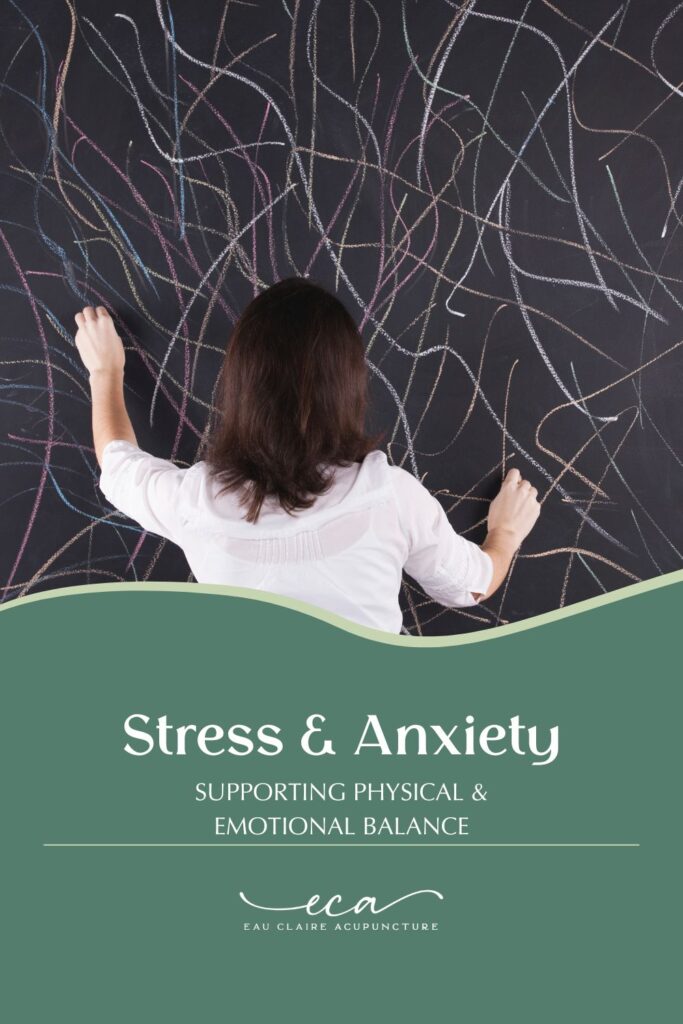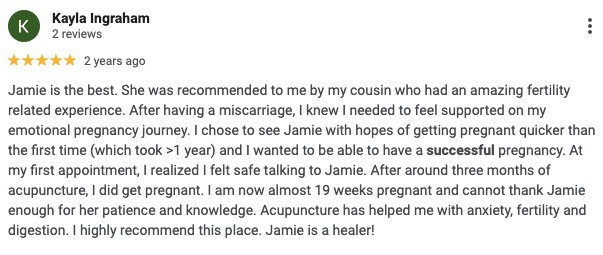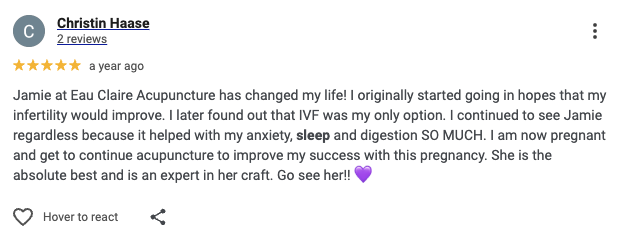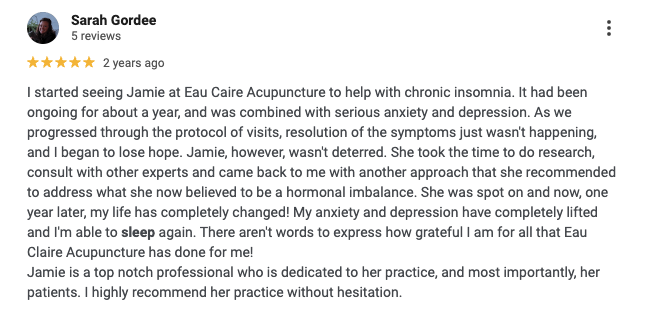MENU
Follow Us
Specializing in fertility, hormone health, and chronic conditions. For those looking for personalized care, especially when conventional options haven’t brought full relief, we blend Traditional Chinese Medicine with evidence-informed care to help you get to the root, support your body, and finally start feeling better.
Modern healthcare designed to treat the whole you — not just the symptoms.
At Eau Claire Acupuncture, one of the things we specialize in is acupuncture for stress and anxiety, helping people navigate the very real effects, from racing thoughts and tense shoulders to the deeper impacts on sleep, hormones, digestion, and immunity.
Our mission is to provide natural, holistic care that supports both physiological and emotional balance in our patients, because we believe that true wellness means feeling good in both body and mind.
We specialize in nervous system regulation, helping calm overactive “fight or flight” responses and guide the body back to a state of rest, safety, and repair. Our treatments go beyond acupuncture, incorporating lifestyle guidance, nutritional support, and personalized care plans to help patients achieve sustainable wellness.
Our approach blends the time-tested wisdom of Traditional Chinese Medicine (TCM) with modern, research-backed insights into biology and the nervous system. This integration allows us to offer care that is not only rooted in tradition but also grounded in science, supporting healing from the inside out.

What is Stress & Anxiety?
Simply put, stress is your body’s reaction to a ‘threat’, whether it’s a real danger or just something your brain sees as a problem.
It’s a short-term response that helps you deal with a challenge or demand. This is known as “good stress” and is essential for decision-making and a healthy, balanced stress response in the body (McEwen, 2017). In essence, it helps you rise to a challenge and then return to balance when the challenge is over.
Anxiety, on the other hand, is a longer-lasting, more persistent state of worry, unease, or overwhelm that can easily get stuck in the “on” position even when there is no clear threat in front of you.
Unlike stress, which tends to pass once the issue resolves, anxiety can interfere with daily life and feel overwhelming. This kind of bad stress doesn’t just affect your mental state, but it can take a serious toll on your physical health as well. It can negatively impact other organ systems, chiefly the brain, as the body is conditioned to be in a state of constant stress (McEwen, 2017).
Chronic anxiety, the overactive stress response, can be linked to many other health concerns beyond the mental load.
Research across the board, especially in cancer populations, shows that stress can (Antoni & Dhabhar, 2019):
- Suppresses cellular immune function, reducing the body’s ability to fight disease.
- Promote chronic inflammation, which is linked to the progression of various illnesses, including cancer and cardiovascular disease.
- Alter hormonal signaling, particularly through the hypothalamic-pituitary-adrenal (HPA) axis, leading to long-term systemic effects (Wang et al., 2014).
- Interfere with treatment outcomes, such as wound healing, immune recovery, and resistance to therapy in cancer.
If you’ve ever felt like your body’s stuck in high gear, or your mind just won’t stop spinning, even when things seem fine, this is exactly what we’re talking about. Chronic stress and anxiety don’t just live in your head; they show up in your whole system.
Biologically, what is stress?
When your body senses a threat, real or perceived, your autonomic nervous system activates the fight-or-flight response. Think heart racing, breath quickens, muscles tense.
Behind the scenes, the hypothalamus-pituitary-adrenal (HPA) axis, an interplay of interactions between your adrenal glands, also kicks in, releasing a cascade of hormones like cortisol to help your body respond and adapt.
This response is helpful in short bursts, but when stress keeps coming, the system can get stuck in overdrive. Over time, this can lead to nervous system dysregulation and depleted energy reserves (Cabıoğlu et al., 2012).
Here’s where it gets interesting: the hormone oxytocin, the one tied to bonding, calm, and connection, actually helps buffer the stress response by dialing down HPA axis activity. And research shows that acupuncture can increase oxytocin levels and help regulate the HPA axis, especially in animal models (Wu et al., 2023).
In simple terms?
Acupuncture gently stimulates the nervous system to shift you out of stress mode and into a calmer, more restorative state. It helps quiet the overactive “fight or flight” response, activate the parasympathetic system (your “rest and digest” mode), and restore balance to the brain and body.
While you may experience a sense of calm after just one session, the true power of acupuncture lies in its ability to re-pattern your stress response over time. It’s not just about quick relief. Acupuncture is a tool for long-term regulation and resilience, making it a sustainable solution for managing stress and anxiety.
How does acupuncture address the stress response?
Acupuncture for treating anxiety disorders has generated strong evidence across clinical trials. Unlike medications, which can come with many side effects, acupuncture is a risk-free, natural option that works with your body’s own systems and can positively impact the chemical and electrical signaling in the nervous system.
There are several mechanisms behind the effectiveness of acupuncture as a correction for both acute and chronic conditions, for anxiety.
Here’s what’s happening behind the scenes:
- Stress doesn’t just impact your hormones (like cortisol via the HPA axis); it also changes how your brain functions.
- When you’re under chronic stress, regions like the limbic system (emotions), insula (internal awareness and regulation), and periaqueductal gray (pain and autonomic control) get stuck in overdrive.
- Acupuncture has been shown to strengthen connections between these brain regions, helping calm the fear centers and regulate the nervous system more effectively (Qin et al., 2008).
- This brain-based modulation may explain why acupuncture helps ease emotional distress, reduce reactivity, and support long-term nervous system balance (Cai et al., 2017).
And it doesn’t stop there.
Acupuncture also increases BDNF (brain-derived neurotrophic factor), a key player in brain health and plasticity, and activates healing pathways that support:
- Neuroprotection and brain cell growth
- Anti-inflammatory and antioxidant responses
- Strengthening the blood-brain barrier
- Cell repair and resilience (Lai, 2019)
What does all this science mean?
Acupuncture is a safe and effective way to help reduce anxiety by calming the brain and nervous system. It helps rebalance how different brain areas communicate, especially those involved in stress and emotions, shifting the body away from constant “fight or flight” mode to a calmer, more balanced state.
On a deeper level, acupuncture supports brain health by promoting cell growth, protecting brain cells, reducing inflammation, and improving the brain’s ability to heal and adapt. In short, acupuncture helps both the mind and body better manage stress and anxiety naturally.
Are you ready to destress and start your healing journey?
Research shows that acupuncture doesn’t just provide temporary calm, it helps balance your nervous system and supports your body’s ability to handle stress more effectively. By addressing the root causes of anxiety, acupuncture offers a promising path to feeling more relaxed and in control.
If you’re ready to try a safe, natural, and effective way to reduce stress and anxiety, we’re here to support you.
Visit our website or book your consultation today and take the first step toward a calmer mind and a more balanced life.
Real life reviews to back up the science!



Written by: Leandra O’Connell
References
Antoni, M. H., & Dhabhar, F. S. (2019). The impact of psychosocial stress and stress management on immune responses in patients with cancer. Cancer, 125(9), 1417-1431.
Cai, R. L., Shen, G. M., Wang, H., & Guan, Y. Y. (2018). Brain functional connectivity network studies of acupuncture: a systematic review on resting-state fMRI. Journal of Integrative Medicine, 16(1), 26-33.
De Almeida, M. D. S., & Cavalca, A. M. B. (2022). Acupuncture and anxiety: possible neural mechanisms. Research, Society and Development, 11(6), e42211629309-e42211629309.
Gold, S. M., & Heesen, C. (2006). Stress and disease progression in multiple sclerosis and its animal models. Neuroimmunomodulation, 13(5-6), 318–326.
Herselman, M. F., Bailey, S., & Bobrovskaya, L. (2022). The Effects of Stress and Diet on the “Brain-Gut” and “Gut-Brain” Pathways in Animal Models of Stress and Depression. International Journal of Molecular Sciences, 23(4), 2013.
Lai, H. C., Chang, Q. Y., & Hsieh, C. L. (2019). Signal transduction pathways of acupuncture for treating some nervous system diseases. Evidence-Based Complementary and Alternative Medicine, 2019(1), 2909632.
McEwen, B. S. (2017). Neurobiological and Systemic Effects of Chronic Stress. Chronic Stress (Thousand Oaks, Calif.), 1, 2470547017692328.
Qin, W., Tian, J., Bai, L., Pan, X., Yang, L., Chen, P., … & Liu, Y. (2008). FMRI connectivity analysis of acupuncture effects on an amygdala-associated brain network. Molecular Pain, 4, 1744-8069.
Sommershof, A., Scheuermann, L., Koerner, J., & Groettrup, M. (2017). Chronic stress suppresses anti-tumor TCD8+ responses and tumor regression following cancer immunotherapy in a mouse model of melanoma. Brain, Behavior, and Immunity, 65, 140–149.
Wang, S. J., Zhang, J. J., & Qie, L. L. (2014). Acupuncture Relieves the Excessive Excitation of Hypothalamic-Pituitary-Adrenal Cortex Axis Function and Correlates with the Regulatory Mechanism of GR, CRH, and ACTHR—evidence-Based Complementary and Alternative Medicine : eCAM, 2014, 495379.
Wu, F., Zhu, J., Wan, Y., Zhou, J., Wang, K., & Chen, T. (2023). Electroacupuncture Ameliorates Hypothalamic‒Pituitary‒Adrenal Axis Dysfunction Induced by Surgical Trauma in Mice Through the Hypothalamic Oxytocin System. Neurochemical Research, 48(11), 3391-3401.
Cabıoğlu, M., İşeri, S., Çoban, A., & Çoban, F. (2012). Role of acupuncture in stress management. Marmara Pharmaceutical Journal, 16(2), 107-114.Yang, X. Y., et al. (2021). Effectiveness of acupuncture on anxiety disorder: a systematic review and meta‑analysis of randomised controlled trials. Ann Gen Psychiatry, 20(1), 9.
Brand photography by Christy Janeczko
Copywriting by The Copy Shift
|
Follow Us
Hours:
Tuesday 9-7
Wednesday 9-7
Thursday 9-7
Friday 9-4
info@eauclaireacu.com
call or text
(715) 575-1220
323 E Madison St, Eau Claire, WI 54703
Book Your Appointment
We blend Traditional Chinese Medicine with evidence-informed care to help you get to the root, support your body, and finally start feeling better.